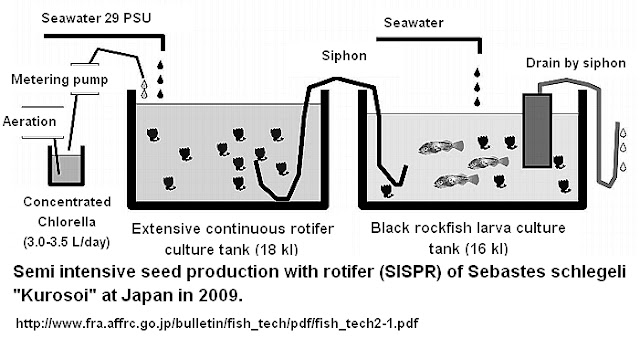Introduction of SISPR (Semi-intensive seed production with rotifer)
Introduction of SISPR
(Semi-intensive seed production with rotifer)
Masatoshi FUTAGAWA / CORDUNAP
September 23, 2012
Recently, the
combination of SISP (Semi Intensive Seed Production) and CERC (Continued Extensive
Rotifer Culture) improve seed quality, survival and reduced cost with black rockfish (P49-55, 2009), Pacific cod (2011)
and sea bream (2011). The method (SISPR; semi intensive seed production
with rotifer) shows that larva culture at harvest tank of CERC with or without
enrichment rotifer. The advantages are produced strong larva, grow faster with
less work activities compared to intensive method.
I recommend the
system consisting 2 units of Rotifer tank and Larva tank (10 kl), cylinder type
(3.6 diameter, 1 m depth), sea and fresh water supply for Rotifer tanks, sea
water supply for Larva tank, heating system for Rotifer tank, air stone (4
units) for both tank. Rotifer culture water is controlled to 28 ̊C and 29 psu
by heater, sea and fresh water supply, and maintains 100 rotifer/ml densities.
Waters and dry phytoplankton powder are applied continually with meter pump and
overflow pass to Larva tank. Larva culture water salinity is controlled to over
32 psu to adding sea water continuously and WT is just similar to sea water. Larvae
are stocked 10 larvae/L density at Larva tank and culture water flow-out
through screen (500 µm mesh) by siphon.
1st
step; Producing larva with pair of 1 kl tanks and study ideal water supply, feeds
quantity and larva density combination, monitor growth and survival of larva.
2nd
step; Scale up to 10 kl cylinder tank and adjust water supply, feeds quantity
and larva density combination in order to produce premium quality of larva with
minimum cost and finalize the method.





it is great , but it is for small scale , what about off mass production
ReplyDelete